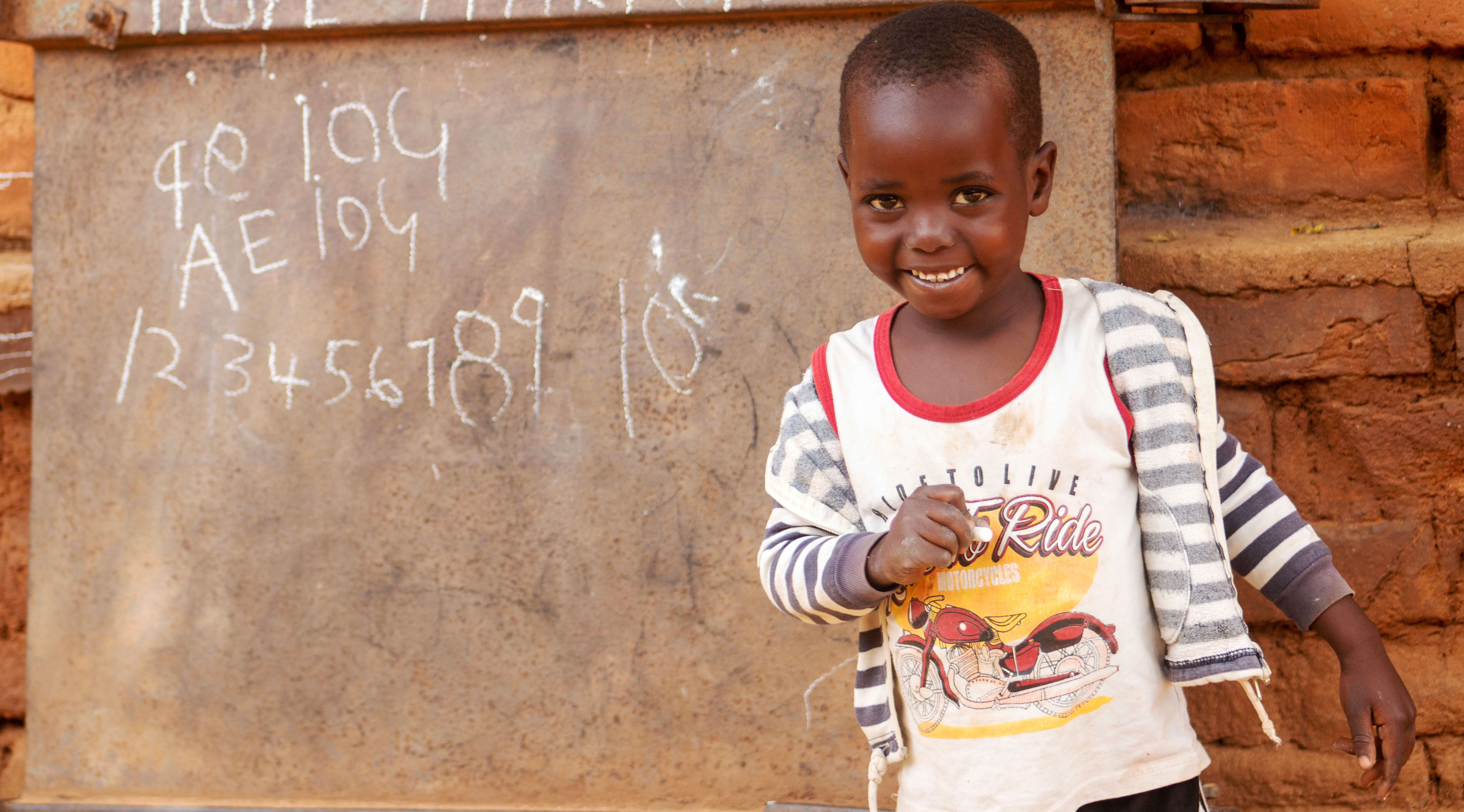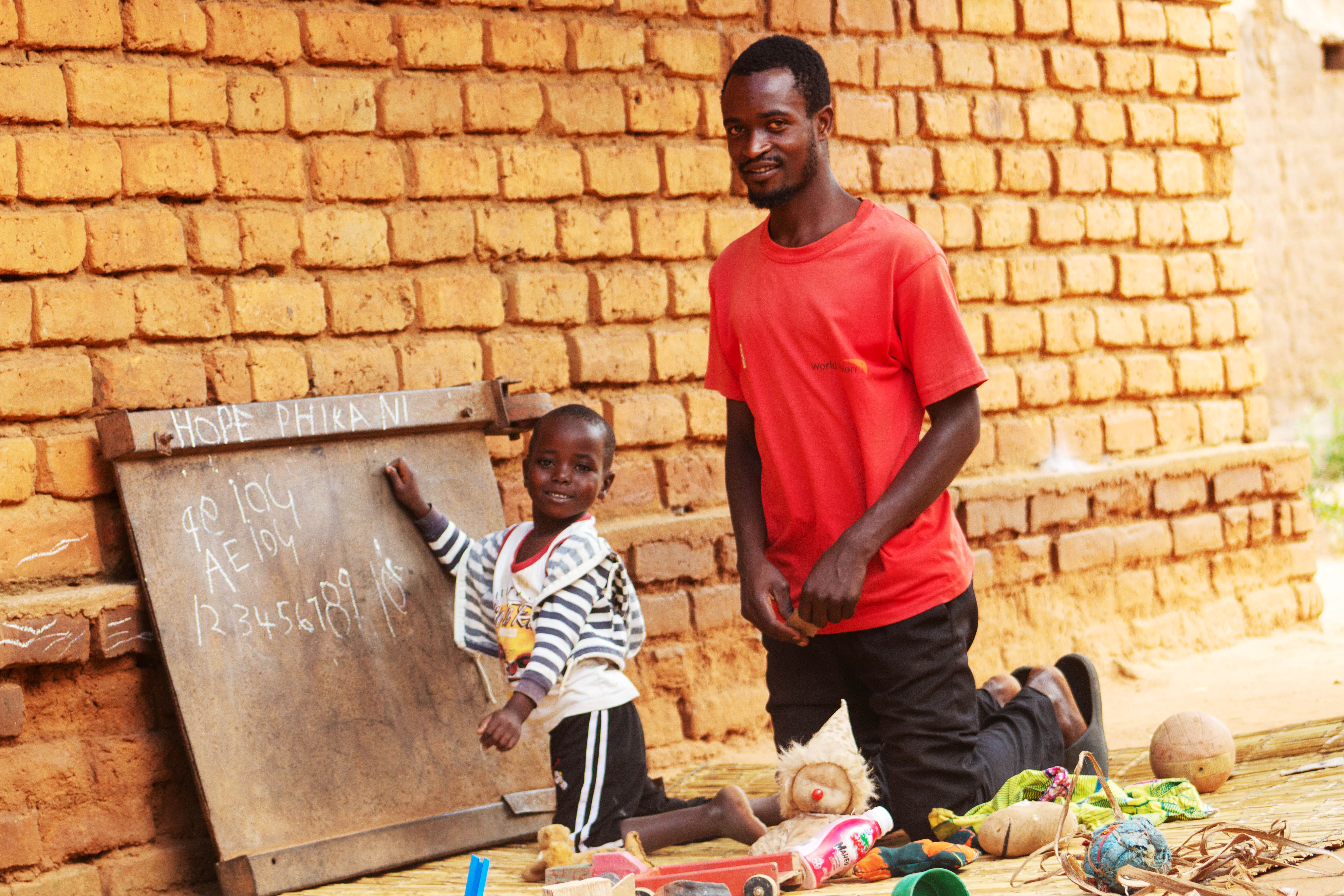A gift that keeps giving
This was a dream that was conceived under the shade of a mango tree led by an enthusiastic 50-year-old Village Headman Chenga who had missed out on his education dreams.
With inspiration from World Vision’s extension workers, he decided to do all he could to help his community’s children.
Since that day 18 years ago, a small group of children gather under a tree for what became Chenga Village’s first Community-Based Childcare Center (CCBC) in Neno.
Under the tree’s shade protecting children from the mid-morning sun of this rain-shadow community, Village Headman Chenga and a handful of other volunteers taught songs, folktales, the alphabet and writing using sticks on the ground. But when seasonal rains began, the centre closed until the dry season.
Such centres were first conceived by the Malawi Government in response to the growing number of children left vulnerable by HIV—giving them a jumpstart on learning—while also affording their parents and guardians a safe space to bring the children while they worked and tended their crop fields.
“Malawi was at the peak of the HIV pandemic and as World Vision we were working with communities to strengthen community-based response, especially towards the children,” recalls Charles Chimombo, World Vision Malawi’s Director of Programs.
As time passed, the centre grew with World Vision’s support. They secured land, and the community built an iron-roofed structure to protect children from extreme weather conditions. They called it Alinafe, which means “God is with us” in Chichewa.
A gift that keeps giving
Some 15 years forward, a shy and closed Naomi who would like to become a nurse one day, joined Chenga Village Early Childhood Development Centre (ECD) following her mother’s decision to give her a better start for her education journey.
Now six years old and in standard two at St. John’s Primary School in Chenga Village, Traditional Authority Symon’s area, her mother is proud of the transformation that has come.
“She was shy and unable to interact with her friends. But now she is able to do that. She can recite the English alphabet too”, says a happy Rebecca as she recounts the change in Naomi ever since she stepped into the children’s play and learning centre.
Her performance has equally been commended by her teachers. Out of 50 learners, Naomi, who aspires to be a teacher, scooped position four to move into standard three.
True to the impact of CCBCs, Naomi is not the only one earning high grades at the school, as her classmate, seven-year-old Raphael already knows how to read and write and performs extremely well in class.
“I would like to be a teacher after school,” says Raphael, as he turns to the other corner of the class to join his friends play football made of plastic sugar papers for the break time.
Naomi and Raphael’s top performance, according to the school’s standard one teacher Tommy Kambiringa, is courtesy of the solid foundation laid through ECD.

Kambiringa explains: “These children are among our top performers. We know this because before starting standard one, they both attended lessons at a CBCC in their village. While some learners are struggling to cope with class work, the two are different in almost everything.”
Kambiringa adds that CBCCs are crucial in facilitating smooth transition for the children to primary schools.
A partnership committed to action
World Vision’s global and national efforts focus on transforming children’s lives. In its current 2021-2025 strategy, the organization aims at making a measurable impact in the lives of 6.5 million children through direct support and policy engagements.
Francis Dube, National Director for World Vision in Malawi acknowledges ECD as a “promise of hope and a future” for vulnerable children in the country.
He outlines that all key sectors at World Vision work to contribute to children’s growth and development, laying the foundation for healthy bodies, minds and spirits as a key step in meeting the Sustainable Development Goals (SDGs).
“Our strategy is a promise to vulnerable children in Malawi, and our renewed commitment to continue pursuing our vision for every child, which is life in all its fullness. This is while we also want to contribute to a number of SDGs, as well as World Vision’s global strategy known as ‘Our Promise” shares Dube, expressing optimism about the role of ECD and the new possibilities for children.
Empowering parents to lead the way

Many parents or guardians in Malawi do not have the opportunity or sufficient knowledge and skills to support children’s early start in learning.
According to recent statistics, 68 in every 100 children in the country do not access ECD. And at 68.6 percent, Malawi has one of the lowest literacy levels in the world. With the Covid-19 pandemic, children, especially those from marginalized places were poised to miss out on their development and education journeys.
But unique, World Vision’s tailored trainings empowered parents and guardians with the right skills to help their children eat, play and love. Others went on to learn to read and write in the process.
During the first 1 000 days of life, which are crucial to child development, Malawian children often experience poor health care, inadequate nutrition, little early stimulation and learning, and the absence of a protective environment.
To sustain child development in the midst of Covid-19, World Vision trained 590 teachers, who subsequently trained 7 451 parents and caregivers of ECD and early primary aged children on children basic learning processes; guidelines for supporting children’s reading at home; development of a conducive home learning instruction space; supporting children’s reading; and creating materials using locally available materials.
“Because many parents don’t have education themselves, we focused on simple instructions and guidelines, such as providing a conducive space for reading and maintaining a daily learning routine”, points out Nkhonde.
Children winning together
While Naomi, Raphael and other ECD graduates are dominating the class, teachers are doing their best to help other learners to catch up.
To this end, Kambiringa deliberately organizes extra lessons at St Johns Primary School to teach the children who are not doing well in class.
Nevertheless, Raphael’s father, Isaak Kalima is a proud parent since his child can read and write at such a young age.
“My child is able to recite the alphabet because he is easily learning new things and is very active in class looking at his exercise books assignments. My other children did not attend CBCC and I can attribute their poor performance to that fact,” says Kalima.
With over 30 goats which have multiplied from the two he got from World Vision’s livestock pass-on programme, Kalima is ready to support all his children through secondary school.
World Vision established 35 ECD centres in Neno. Across the country, the organization is working with 58 866 children in 941 ECD centres. In the past five years, the organization has trained 2 679 caregivers.